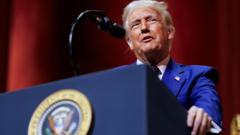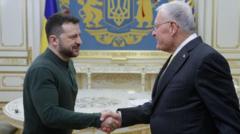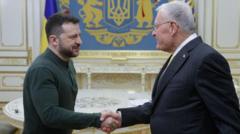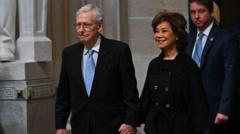The Russian government, through its sovereign wealth fund, is urging American companies to reconsider their withdrawal from Russia, presenting the possibility of significant financial gains if they re-enter the market.
Kremlin Encourages Trump to Explore Business Opportunities in Russia

Kremlin Encourages Trump to Explore Business Opportunities in Russia
Russian officials entice U.S. businesses to return to Russia, proposing lucrative chances amid ongoing tensions with Ukraine.
The article text:
In a recent meeting in Riyadh, Saudi Arabia, Kirill Dmitriev, the head of Russia's sovereign wealth fund, made a compelling case to the Trump administration about why U.S. companies should reinvest in Russia. Dmitriev, equipped with impressive credentials from Harvard and McKinsey and fluent in English, presented a stark printout detailing the financial losses incurred by American businesses since exiting Russia due to the conflict in Ukraine. The total calculated was an eye-popping $324 billion, indicative of the substantial economic opportunities that American firms have left on the table.
Russian leaders, including President Vladimir Putin, have framed this discussion around economic cooperation, expressing a strong interest in removing "artificial barriers" that inhibit foreign investment—implicitly targeting the sanctions imposed by the U.S. Following the discussions, Foreign Minister Sergey Lavrov indicated that there were significant interests from the Trump administration in eliminating these barriers for improved economic ties.
The negotiations signal that the Trump administration may be considering a more accommodating stance toward Russia, contrasting its usual pressure on other nations, especially allies over military expenditures. The prevailing narrative emphasizes Trump’s inclination toward profit, showcasing potential lucrative outcomes for American corporations if they were to re-engage commercially with Russia.
Amidst these overtures, concerns arise in Europe and Ukraine regarding Trump’s approach, with apprehensions that his administration might seek terms favorable to Russia in exchange for peace, especially after making statements placing some blame on Ukraine for the initiation of hostilities. This reflects a potential shift that could reshape American foreign policy priorities in the region and impact global geopolitics significantly.
In a recent meeting in Riyadh, Saudi Arabia, Kirill Dmitriev, the head of Russia's sovereign wealth fund, made a compelling case to the Trump administration about why U.S. companies should reinvest in Russia. Dmitriev, equipped with impressive credentials from Harvard and McKinsey and fluent in English, presented a stark printout detailing the financial losses incurred by American businesses since exiting Russia due to the conflict in Ukraine. The total calculated was an eye-popping $324 billion, indicative of the substantial economic opportunities that American firms have left on the table.
Russian leaders, including President Vladimir Putin, have framed this discussion around economic cooperation, expressing a strong interest in removing "artificial barriers" that inhibit foreign investment—implicitly targeting the sanctions imposed by the U.S. Following the discussions, Foreign Minister Sergey Lavrov indicated that there were significant interests from the Trump administration in eliminating these barriers for improved economic ties.
The negotiations signal that the Trump administration may be considering a more accommodating stance toward Russia, contrasting its usual pressure on other nations, especially allies over military expenditures. The prevailing narrative emphasizes Trump’s inclination toward profit, showcasing potential lucrative outcomes for American corporations if they were to re-engage commercially with Russia.
Amidst these overtures, concerns arise in Europe and Ukraine regarding Trump’s approach, with apprehensions that his administration might seek terms favorable to Russia in exchange for peace, especially after making statements placing some blame on Ukraine for the initiation of hostilities. This reflects a potential shift that could reshape American foreign policy priorities in the region and impact global geopolitics significantly.





















